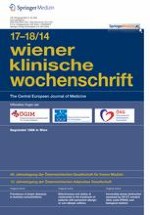Anzeige
01.09.2014 | original article
Psychological well-being of gynecologic and obstetric patients: a validation of the 12-item Well-Being Questionnaire (W-BQ12)
Erschienen in: Wiener klinische Wochenschrift | Ausgabe 17-18/2014
Einloggen, um Zugang zu erhaltenSummary
Background
Gynecology and obstetrics are areas of medicine associated with emotionally loaded concerns. Both positive and negative aspects of psychological well-being can be assessed with the 12-item Well-Being Questionnaire (W-BQ12). Our study aimed to evaluate the psychometric properties of the W-BQ12 in gynecologic and obstetric patients.
Methods
A cohort of 228 gynecologic patients, consisting of endocrinologic (n = 102) and obstetric (n = 126) subgroups, responded to a structured interview or to a questionnaire about sociodemographic and medical data, and to a set of psychometric tests: the W-BQ12, the Hospital Anxiety and Depression Scale (HADS), the Beck Depression Inventory (BDI), and the Hamilton Depression Scale (HAMD). Except for the current health problem, all probable confounding factors (psychiatric, oncologic, or other somatic morbidity, postmenopausal status) were excluded.
Results
The W-BQ12 scores correlated significantly and adequately (r = 0.35–0.80) with reference instruments (HADS, BDI, and HAMD). The internal consistency, measured by Cronbach’s alpha, was very good for the whole questionnaire (0.86) as well as for the subscales (0.76–0.79). The principal component analysis indicated a clear three-factor structure with eigenvalues >1. Factors 1 (“negative well-being”), 2 (“positive well-being”), and 3 (“energy”) explained 22, 21, and 19 % of the variance, respectively.
Conclusions
The W-BQ12 is suitable for the global assessment of psychological well-being, as well as for differentiation between negative and positive well-being aspects in gynecologic patients.
